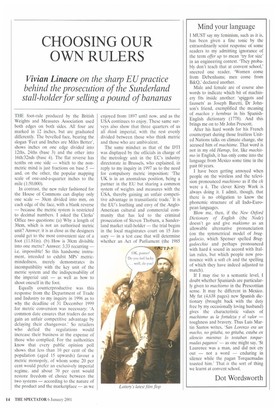Mind your language
I MUST say my feminism, such as it is, has been given a fine tonic by the extraordinarily sexist response of some readers to my admitting ignorance of the term offer up to mean 'try for size' in an engineering context. 'They probably don't teach that at convent school,' sneered one reader. 'Women come from Debenhams; men come from B&Q,' declared another.
Male and female are of course also words to indicate which bit of machinery fits inside another: `spiggots and faussets' as Joseph Baretti, Dr Johnson's friend, exemplified the meaning of machos y hembras in his SpanishEnglish dictionary (1778). And this brings me on to Mr John Prescott.
After his hard words for his French counterpart during those fruitless United Nations talks on climate change, she accused him of machisme. That word is not in my old Harrap, for, like machismo in English, it has only come into the language from Mexico some time in the past 60 years.
I have been getting annoyed when people on the wireless and the television pronounced machismo as if the ch were a k. The clever Kirsty Wark is always doing it. I admit, though, that there is no obligation to know the phonemic structure of all Indo-European languages.
Blow me, then, if the New Oxford Dictionary of English (the Node) doesn't go and give makisrno as an allowable alternative pronunciation (on the symmetrical model of braggadocio, which Spenser spelled Braggadocchio and perhaps pronounced with hard k sound in accord with Italian rules, but which people now pronounce with a soft ch and the spelling of which they have indeed adjusted to match).
If I may rise to a semantic level, I doubt whether Spaniards are particularly given to machismo in the Prescottian sense. It may be different in Mexico. My fat (4,638 pages) new Spanish dictionary (brought back with the duty free by my occasionally loving husband) gives the characteristic values of machismo as la fortaleza y el valor — toughness and bravery. Thus Luis Martin Santos writes, 'San Lorenzo era un macho, no gritaba, no gritaba, estaba en silencio mientras to tostaban torquemadas paganos. — as one might say, 'St Laurence was a man, and did not cry out — not a word — enduring in silence while the pagan Torquemadas toasted him.' That is the sort of thing we learnt at convent school.
Dot Wordsworth


















































 Previous page
Previous page